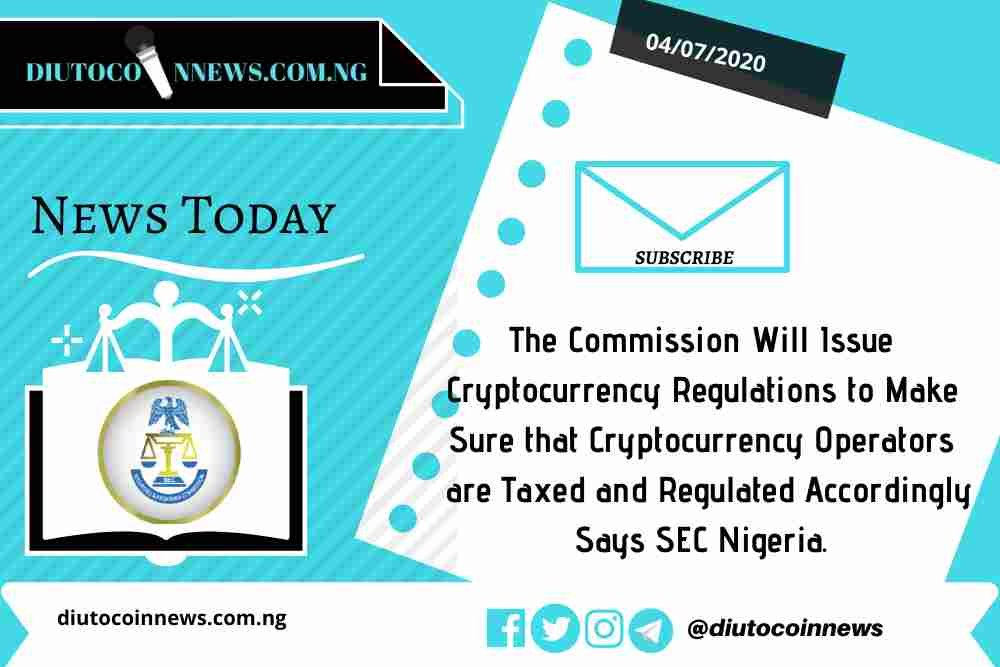At a recent online conference on the “Regulations of Cryptocurrency and Virtual Assets”, featuring Dr Timi Agama—Deputy Director, Registration, Exchange and Market Infrastructure of the Securities Exchange Commission (SEC) of Nigeria.
The recently concluded conference was organised by LawAllianz in collaboration with Blockchain Nigeria User Group (BNUG) to discuss the state of cryptocurrency regulation in Nigeria and make sure a safe environment is set up around it for innovators and potential investors.
The panelists includes Yahaya Maikori of LawAllianz, Simona Camilleri of Moneybit Ltd, Malta, Dr Timi Agama of SEC Nigeria, Chimezie Chuta of Blockchain Nigeria User Group, Olosola Mesele of LawAllianz and Bolaji Onibodu of Nigeria Custom Service.
Dr Timi Agama said that the government is very much aware of cryptocurrency and the underlying benefits that come with it, “Cryptocurrency, virtual assets is a fantastic opportunity because it will open up a new vista for investment and raising capital.”
He equally stressed that the government is moving towards issuing regulations anytime soon since after the final report of the fintech roadmap was submitted to the SEC Nigeria.
He explained that the commission is trying to make sure that it will issue cryptocurrency regulations in Nigeria the right way, protecting investors at different levels, “We have our investors to protect, we have a lot of publics coming into this cryptocurrency to protect.
“But then we want to assure that as regulators we are not killing innovations but to accommodate and regulate it.”
Simona Camilleri, a 15 years experienced lawyer specialized in online and offline activities within the crypto space and otherwise, having worked in Malta and Estonia also highlights the need for a law governing an experienced investor and an inexperienced investor in dealing with digital currency crowdfunding activities.
These (cryptocurrency regulations) laws she suggests will limit an inexperienced investor by having a maximum amount of contribution he can invest during crowdfunding activities.
Read Also: Final Report of the Fintech Roadmap Accepted by the Nigeria Capital Markets Says Cryptocurrencies are not a Currency But Commodity nor Security.
Licensing Cryptocurrency Operators:
Simona also notes that Estonia have issued up to 1500 licenses to cryptocurrency businesses but revoked over 500 in a bid control capital requirements from operators and make sure that they abide by the AML requirements including terrorism funding.
Dr Agama also points out that its the duty of the commission to make sure that at all levels, cryptocurrency operators in Nigeria and likewise others offering cryptocurrency services focused at Nigeria investors abide by Anti-Money Laundering requirements and other regulations.
“On regulations, operators offering services within the ambit of the federation must be taxed and face regulation, the fact is that we haven’t issued regulation, once we do that, they must face the regulations. Going against it means illegality.
“A cryptocurrency operator who sets up a business must be taxed and face the regulations issued by the government surrounding the business.”
Chimezie Chuta also notes that cryptocurrency regulations in Nigeria are required within the ambit of cryptocurrency custodian wallet issuers, “We need to have a kind of protection for people or investors using customize wallets, we believe It’s the duty of the SEC to issue rules guiding people issuing wallets to protect users in the space”.
Olosola Mesele highlights that while there is yet, a reliable regulatory homework around the globe, the government should work towards implementing the right steps for operators including KYC (Know Your Customer) requirements to protect investors and keep the ecosystem safe.
Bolaji Onibodu, a member of the commission set up by the Nigeria Custom Service, to draft procedures towards deploying blockchain technology for verification and automation of the issuance of licenses to business owners in Nigeria also notes that,
“The project was focused on the Excise Trade department of the Nigerian Custom Service.
“Blockchain technology happened to be the very available last resort towards the issuance of License to establish an excise premise (a manufacturing plant) to business owners to verify its authenticity and automate storage and retrieval.”
This way it will be easier to regulate businesses likewise other cryptocurrency operators around Nigeria.
Favorite Regulations to Support Innovations:
Simona notes that most times fee requirements for cryptocurrency operators to function usually affects them in terms of capital funds and taxes.
To this regard, Dr Agama notes that, “cryptocurrency operators face a lot of issues, they make a lot of mistakes because it is never a one man game. It is never you alone, you will need to aggregate resources to be able to withstand regulations.
“You don’t go and set up a business because maybe you understand the aspects of the business with regards to maybe how to code and create applications. It doesn’t work like that.
“Before we take you in, you must show that you can withstand the storm, you are credible and have good intentions with what you are offering to be approved by the regulators.”
Chimezie Chuta also notes that the government should create a friendly, simple and direct regulations in other not to stifle innovations in the space, “Simple and easy rules not stifling innovation and application process for businesses.”
Chimezie also advocates for a clear definition of what constitutes a scam project to enable them know what project to label as scam, “We need to have a solid definition of what constitutes a scam project to help us know and be able to tag a project scam when need be.”
These he believes will help to achieve market stability for bringing real institutional investment into the space.
Stablecoins Regulation.
Dr Agama notes that stablecoins are not to be seen as securities or commodities. He notes that stablecoins are derivatives and as such will be regulated accordingly.
Read Also: Understanding What is Stablecoin Like ABCD stablecoin Pegged to Naira and How It Works.
“Stablecoins are not legal tenders, but rather derivatives of which SEC Nigeria regulates its activities.
“We are doing our best to make sure to deliver ahead of time. And also issue regulations supporting innovations.”
Yahaya Maikori urges the government through its regulator, the SEC Nigeria represented by Dr Agama to create a friendly environment for innovation and growth.
He also applauded the government for its commitment towards making a safe environment for operators and potential investors around the sector.
Discover more from DiutoCoinNews
Subscribe to get the latest posts sent to your email.















